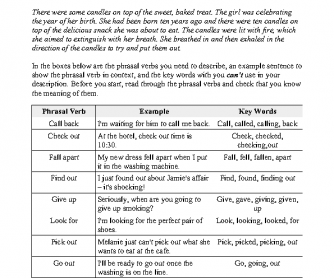Phrasal Verbs In Sentences
Posted By admin On 13.01.19Intransitive Phrasal Verbs. Intransitive phrasal verbs have no direct object. (A direct object is “acted upon” by the verb). Examples of intransitive phrasal verbs: I woke up at 10:30 AM. You can come over to my house after school. He’s going back to Russia next month. Click here for a list of 15 intransitive phrasal verbs with example sentences. Phrasal verb meaning: 1. A phrase that consists of a verb with a preposition or adverb or both, the meaning of which is different from the meaning of its separate parts: 2. A combination of a verb and an adverb or a verb and a preposition, or both, in which the combination has a meaning different.
What are Phrasal Verbs? Phrasal verbs are verbs with two or three words: main verb + particle (preposition or adverb) Examples: • I wake up at 7:30 every day. • Please turn off the TV. • My brother and I don’t get along. We fight all the time. • She came up with a good idea.
Phrasal verbs are difficult because you often can’t understand the meaning of each expression from the words themselves. Also, many phrasal verbs are very similar (take up, take on, take in, take over, etc.) and a number of phrasal verbs have multiple meanings.

20 Phrasal Verbs In Sentences

Phrasal Verbs Meanings And Examples
In this lesson, you’re going to learn 4 types of phrasal verbs and how each one functions in an English sentence. Phrasal verbs can be transitive or intransitive. Transitive phrasal verbs can be separable or inseparable. Phrasal verbs in English are transitive or intransitive. The intransitive phrasal verbs can be separable or inseparable. Intransitive Phrasal Verbs Intransitive phrasal verbs have no direct object. (A direct object is “acted upon” by the verb).